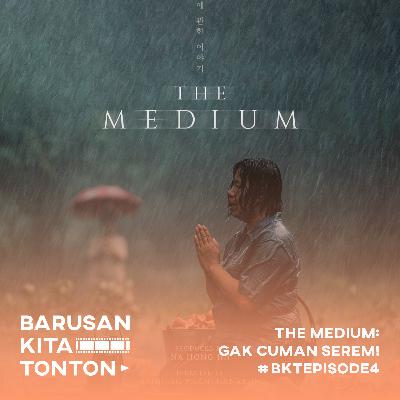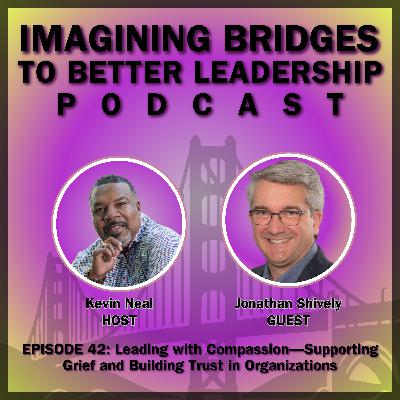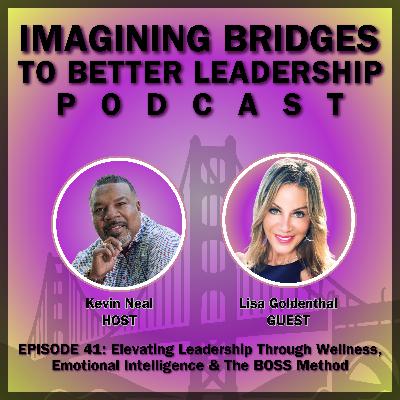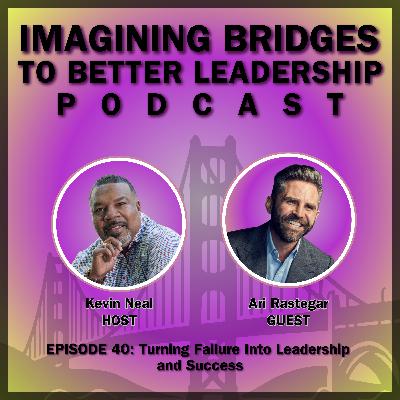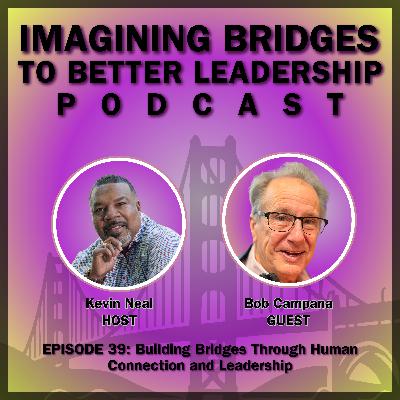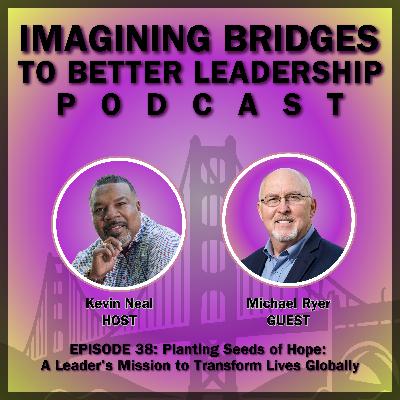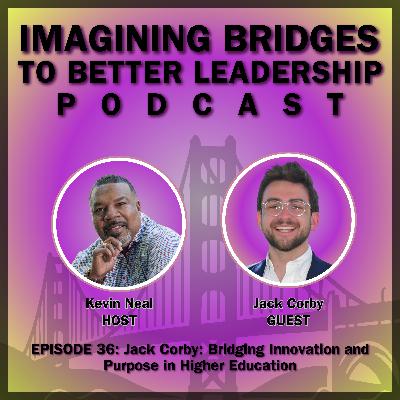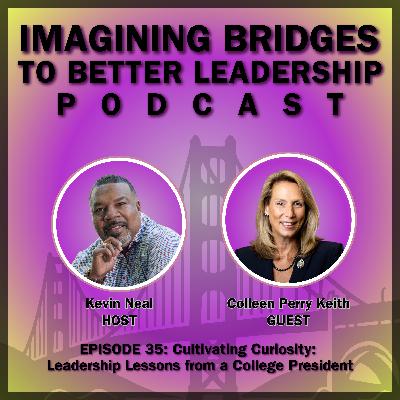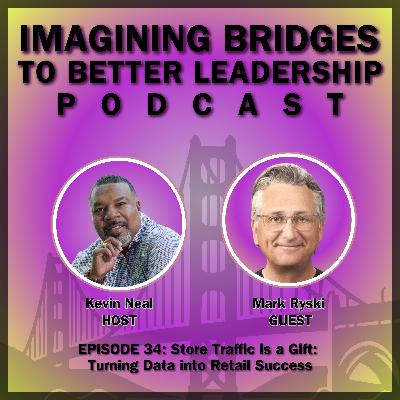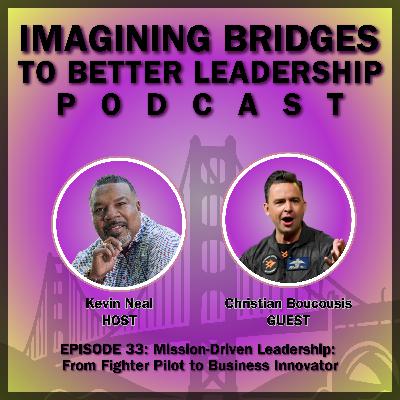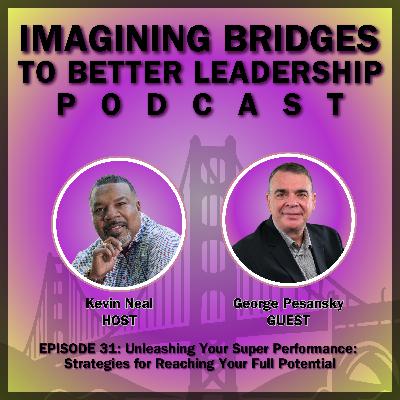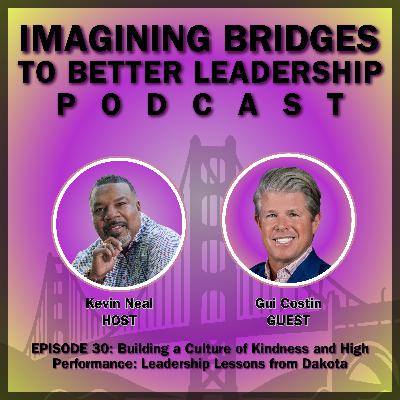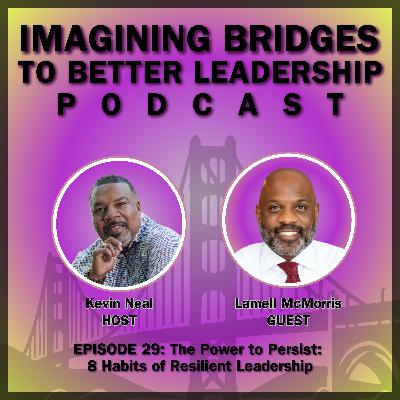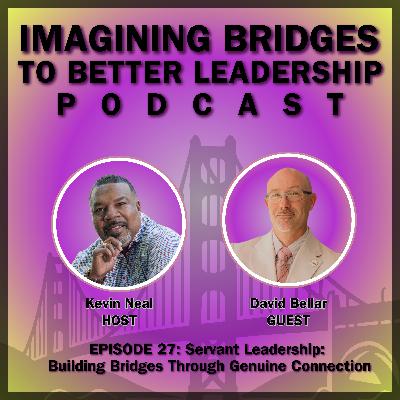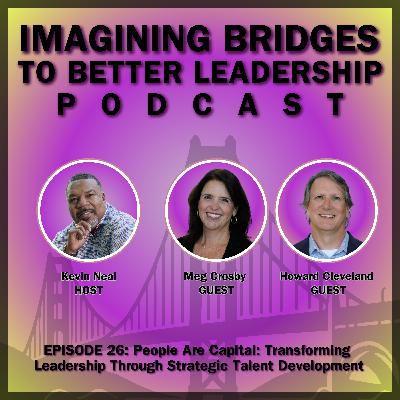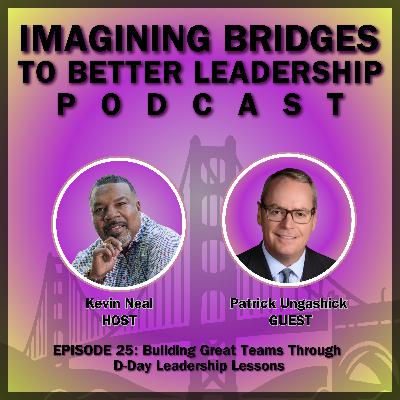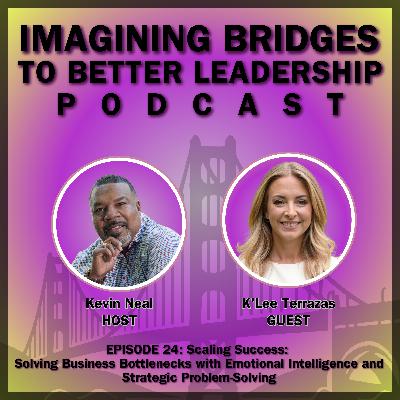Discover Imagining Bridges to Better Leadership
Imagining Bridges to Better Leadership

Imagining Bridges to Better Leadership
Author: Kevin Neal
Subscribed: 1Played: 0Subscribe
Share
© Copyright 2025 | All Rights Reserved
Description
Effective leadership starts with strong communication and connection. Each episode of Imagining Bridges to Better Leadership offers actionable tips, expert advice, and inspiring stories to help you create thriving teams and sharpen your leadership skills. Whether you’re managing a small business, leading a team in higher education, or driving growth in a midsized organization, this show is for you.
43 Episodes
Reverse
About Andy Posner:Andy Posner is the founder and CEO of Capital Good Fund. He’s a leader redefining what financial stewardship looks like—proving that effective leadership is not just about vision, but about using that vision to lift people out of poverty. Andy’s work blends purpose, courage, and action, making him a model for leaders who want to create real, measurable impact.In this episode, Kevin and Andy Posner discuss:Turning financial services into tools for empowerment rather than exclusionWhy is relentless curiosity and determination fuel innovationThe intersection of environmental sustainability, justice, and povertyBuilding new systems when traditional ones fail marginalized communitiesHow personal calling, values, and resilience shape long-term leadershipKey Takeaways:Innovation begins where others stop trying. Leadership is defined by a refusal to accept that something “can’t be done.” When systems shut people out, leaders must imagine new pathways—whether it’s alternative underwriting models or creative financial structures that uplift vulnerable communities.Purpose often emerges through unexpected turns. Sometimes, calling is discovered through curiosity, conviction, and a willingness to respond to the needs you witness in the world.Financial tools can liberate or oppress — leadership determines which. By reframing lending as a means of justice rather than profit extraction, leaders can design systems that restore dignity, build stability, and unlock opportunity for people traditionally excluded from financial services.Long-term impact is built one relationship at a time. Sustainable change is relational before it is financial."Financial services could really be a tool of oppression, and on the other hand, it could be a tool of uplift and opportunity." – Andy PosnerConnect with Andy Posner:Website: www.capitalgoodfund.orgConnect with Kevin Neal:Website: https://drkdneal.com Book: https://www.amazon.com/gp/aw/d/B0C47RZDSS https://www.amazon.com/Guided-Greatness-Mentorship-Developing-professionals-ebook/dp/B0FGBH1VNSEmail: coachkd63@gmail.com LinkedIn: https://www.linkedin.com/in/coachkd63
About Jonathan Shively:Jonathan has over 35 years of experience as a pastor, educator, fundraiser, and church and nonprofit executive. He is currently the Executive Director of Fox Valley Hands of Hope, a nonprofit providing no-cost grief care following a death loss. Additionally, he is a leadership and organizational companion through ArtistryLeads. Jonathan’s personal mission is to increase individuals' and organizations' capacity to fulfill their callings, fostering healthy leaders and communities. His north star is Jesus and the New Testament. He has been married for 35 years, a proud father of three young adults and one son-in-law, including a son with Williams Syndrome. He is a musician, choir director, and singer-songwriter, and enjoys camping, reading, working with his hands, serving on Boards, and volunteering. Jonathan is an ordained minister in the Church of the Brethren and holds a Doctor of Ministry Degree from Fuller Seminary.In this episode, Kevin and Jonathan Shively discuss:Why servant leadership requires humility, empathy, and relational connectionHow grief impacts workplaces and why leaders must understand the grieving processThe importance of authenticity and trust in building healthy teamsLeading organizations through seasons of transition, struggle, and renewalHow personal calling and lived experience shape a leader’s ability to serve othersKey Takeaways:Servant leadership starts with intention, not titles. Great leadership is not just about what you accomplish — but how you walk with people through the journey. Grief is universal, and leaders who ignore it harm their teams. Most workplaces are unprepared to support grieving employees, yet grief profoundly affects focus, performance, and emotional health. Healthy organizations are built on relationships, not transactions. Whether in churches, nonprofits, or corporations, relational leadership creates safety, understanding, and resilience. When people feel known and valued, they trust their leaders — even during uncertainty or change. A fulfilling career comes from alignment, not ambition. The most meaningful work happens when a leader’s gifts, passions, and purpose meet the real needs of an organization. Misalignment leads to frustration on all sides, but when values match mission, both leaders and organizations thrive."There's no substitute for just human compassion and kindness." – Jonathan ShivelyConnect with Jonathan Shively:Website: http://fvhh.net | http://www.artistryleads.com LinkedIn: https://www.linkedin.com/in/jonathanshively/ Connect with Kevin Neal:Website: https://drkdneal.com Book: https://www.amazon.com/gp/aw/d/B0C47RZDSS https://www.amazon.com/Guided-Greatness-Mentorship-Developing-professionals-ebook/dp/B0FGBH1VNSEmail: coachkd63@gmail.com LinkedIn: https://www.linkedin.com/in/coachkd63
About Lisa Goldenthal:Lisa Goldenthal is a Top 15 Executive Coach, bestselling author, and host of WholeCEO with Lisa G. Known for her signature BOSS Method, she helps high-performing CEOs and leaders master energy, emotional intelligence, and execution to lead powerfully in disruptive times. With decades of experience coaching elite executives and teams, Lisa blends mindset, accountability, and strategy to drive rapid, lasting success. Her work has been featured in CEO Weekly and across top leadership platforms worldwide.In this episode, Kevin and Lisa Goldenthal discuss:How emotional intelligence and self-awareness drive leadership excellenceWhy leaders must manage their energy with intention, not accidentEscaping burnout through discipline, boundaries, and habit-stackingThe shift from hustle culture to presence, empathy, and communicationBuilding confidence, clarity, and courage through self-leadershipKey Takeaways:Leadership begins with managing your own energy. Everything a leader touches is influenced by the state they bring into the room: their clarity, presence, discipline, and emotional grounding. When leaders intentionally shape their inner world, they naturally elevate their outer impact. Emotional intelligence isn’t optional anymore — it’s the skill that separates leaders people follow from leaders people tolerate. Burnout is often a byproduct of mismanaged priorities. High-performers excel at discipline in their careers but often fail to apply that same discipline to their own well-being. When leaders delegate, set boundaries, and build small but powerful habits, they create sustainability instead of exhaustion. Communication is more than what you say; it’s how deeply you connect. Leaders build engagement by listening more than they speak, showing genuine interest, looping for understanding, and creating relational safety within their teams. Influence grows when people feel seen."Communication is so much more than speaking. It's really listening more than you speak." – Lisa GoldenthalConnect with Lisa Goldenthal:Website: https://highperformanceexecutivecoaching.com/ LinkedIn: https://www.linkedin.com/in/lisa-goldenthal-innovation-management-technology-future-careers-personaldevelopment/ YouTube: https://www.youtube.com/channel/UCdfuhGW9FoG_0qrp5jyU6hwBook: https://www.amazon.com/Boss-Up-Execute-Achievers-Performance/dp/B0F1Y8YZG1 Connect with Kevin Neal:Website: https://drkdneal.com Book: https://www.amazon.com/gp/aw/d/B0C47RZDSS https://www.amazon.com/Guided-Greatness-Mentorship-Developing-professionals-ebook/dp/B0FGBH1VNSEmail: coachkd63@gmail.com LinkedIn: https://www.linkedin.com/in/coachkd63
About Ari Rastegar:Ari Rastegar is the Founder and CEO of Rastegar Capital, a vertically integrated real estate investment firm with a diversified portfolio spanning multifamily, industrial, and mixed-use properties across the United States and abroad.Dubbed “The Oracle of Austin” by Forbes, Ari has built a billion-dollar platform grounded in innovation, data-driven strategy, and disciplined execution. A recognized thought leader on real estate, leadership, and human performance, he has been featured in The Wall Street Journal, Bloomberg, CNBC, Forbes, and GQ.Ari is also the author of The Gift of Failure, where he shares lessons on resilience, mindset, and building lasting success through adversity.In this episode, Kevin and Ari Rastegar discuss:Why failure is an essential and unavoidable part of progressHow faith, imagination, and hard work shaped Ari’s leadership journeyLearning to redefine success and fulfillment through personal growthThe discipline of raising your standards to transform every area of lifeBuilding resilience through humility, experimentation, and self-leadershipKey Takeaways:Failure isn’t the opposite of success — it’s the curriculum. Every setback provides new variables, new wisdom, and new data points that shape stronger leaders. The goal isn’t perfection; it’s progress.Fulfillment and success must coexist. You can achieve everything the world defines as success and still feel empty. Leaders thrive when they pursue achievement and joy, purpose, faith, and emotional wholeness.Raising your standards changes your life. Whether it’s health, relationships, leadership, or discipline, transformation begins the moment you decide the old standard is no longer acceptable.Self-leadership is the starting point for all other leadership. If you can’t discipline yourself, manage your mindset, and control your habits, you can't guide a team, a business, or a community with integrity."It's not what we don't know that gets us in trouble. It's what we know for sure that just ain't so.” – Ari RastegarConnect with Ari Rastegar:Website: http://www.rastegarcapital.com X: https://twitter.com/arirastegar Instagram: https://www.instagram.com/rastegar/ LinkedIn: https://www.linkedin.com/in/arirastegarFacebook: https://www.facebook.com/AriRastegar/ YouTube: https://www.youtube.com/@Ari_Rastegar Book: https://www.amazon.com/Audible-The-Gift-of-Failure/dp/B0B75TBXNC/ Connect with Kevin Neal:Website: https://drkdneal.com Book: https://www.amazon.com/gp/aw/d/B0C47RZDSS https://www.amazon.com/Guided-Greatness-Mentorship-Developing-professionals-ebook/dp/B0FGBH1VNSEmail: coachkd63@gmail.com LinkedIn: https://www.linkedin.com/in/coachkd63
About Bob Campana:Robert “Bob” Campana is a California builder, landscape designer, real estate developer, restaurateur, and all-around serial entrepreneur. Born in San Francisco, he grew up in the Sierra Nevada foothills. At age twenty, he quit his job on a backwoods survey crew to travel the world, a journey that changed his life. Returning to California, he started a small business manufacturing and installing redwood hot tubs and eventually grew the company into one of the state’s premier swimming pool builders. He later launched and acquired several other successful ventures, including Modesto’s popular Redwood Café, which Yelp calls “one of America’s most romantic restaurants.” In 2022, he created Redwood Café Tours to develop luxury small-group adventures in Europe, Asia, and Oceania. An experienced helicopter and airplane pilot, he travels the world and celebrates life with his wife, Lynna.In this episode, Kevin and Bob Campana discuss:Leading with humility and the responsibility that comes with influenceHow faith, purpose, and stewardship shape long-term leadershipThe role of mentors and community in personal and professional growthBuilding businesses that put people firstFinding meaning beyond achievement and material successKey Takeaways:Leadership begins with stewardship, not status. When leaders view their influence as something entrusted to them — not owned by them — they make decisions that elevate people, strengthen communities, and reflect deeper purpose.Humility forms the foundation of lasting leadership. Leaders who stay grounded, acknowledge their limitations, and give credit to others build trust that can withstand conflict, change, and growth.Success without significance leaves leaders empty. Achievements matter, but they become transformative only when connected to serving others, investing in people, and aligning work with personal values and faith.Mentorship and community aren’t optional — they are essential. Leaders grow when they listen, learn from others' experiences, and surround themselves with people who challenge and support their calling.“So being able to craft and make positive experiences, not only for yourself but for others, makes your life fuller and richer.” – Bob CampanaConnect with Bob Campana:Website: http://bobcampana.com/ YouTube: http://www.youtube.com/@GetBack2Workk LinkedIn: http://linkedin.com/in/bob-campana-entrepreneur Book: https://www.amazon.com/Dont-Look-Down-Battle-Tested-Entrepreneur/dp/B0F9H1YGTT Connect with Kevin Neal:Website: https://drkdneal.com Book: https://www.amazon.com/gp/aw/d/B0C47RZDSS https://www.amazon.com/Guided-Greatness-Mentorship-Developing-professionals-ebook/dp/B0FGBH1VNSEmail: coachkd63@gmail.com LinkedIn: https://www.linkedin.com/in/coachkd63
About Michael Ryer:Michael E. Ryer serves as President and CEO of Amigos Internacionales, bringing nearly five decades of ministry and nonprofit leadership to the organization. His calling began in Bonham, Texas, where he first served as a Music and Youth Minister at Boyd Baptist Church before leading in various youth, education, and administrative roles across North and East Texas.An educator and mentor at heart, Michael has taught at Navarro College and Grand Canyon University, sharing practical lessons on leadership, faith, and the history of Christianity. His teaching and ministry are known for being authentic, compassionate, and grounded in real-world experience.Michael’s global service includes time in Israel, Guam, Ukraine, and Belize, where he has led mission efforts and launched sustainable community projects like a mobile kitchen to address food insecurity. As founder of Missionpoint Initiatives, he continues to expand solutions in education and healthcare for underserved regions, always tying practical help to hope in Christ.At Amigos Internacionales, Michael directs programs addressing clean water, education, health, and faith, and has led major disaster relief operations, including for Hurricanes Katrina and Rita. In 2024, The Top 100 Magazine recognized him as one of America’s top innovators and entrepreneurs for his work connecting faith, leadership, and action.A pastor at heart, Michael leads with humility, sincerity, and purpose. His life verse, Deuteronomy 30:19, reflects his lifelong mission: to help others “choose life” and live with intention, faith, and compassion.In this episode, Kevin and Michael Ryer discuss:What it means to live and lead through faith-driven purposeThe lessons learned from decades of ministry and humanitarian workHow leadership transforms when rooted in compassion and humilityBuilding partnerships that empower communities rather than create dependencyThe joy and challenge of leading with authenticity in times of uncertaintyKey Takeaways:Faith-driven leadership begins with service, not status. True influence comes from helping others rise, not from controlling outcomes, and that shift from authority to humility changes everything.Leadership is never about perfection; it’s about presence. Mistakes, vulnerability, and transparency don’t weaken a leader — they make their humanity relatable and their example worth following.Legacy isn’t built overnight. The seeds planted today may take decades to grow, but investing in people, relationships, and purpose leaves a lasting impact that far outlives the leader.The greatest success stories start with compassion. When leaders see others as partners, not projects, they help communities unlock their own strength and sustainability."Success is understanding that you're planting trees that you will never sit under the shade." – Michael RyerSupport Amigos Internacionales’ Current MissionsAmigos Internacionales is currently raising support for two urgent surgeries that will change young lives forever:Help Alfred Heal – Alfred is a 12-year-old boy from South Sudan who was severely burned by rebels after his father was killed. You can help fund his lifesaving burn surgeries here: https://www.gofundme.com/f/help-alfred-heal-lifesaving-burn-surgeries-for-a-12yr-old Restoring Smiles, Restoring Hope – A double cleft palate surgery for Ojok, part of Amigos’ ongoing mission to bring healing and hope through medical care: https://www.amigosii.org/restoring-smiles-restoring-hope-the-story-of-ojok-and-bethel-smile Connect with Michael Ryer:Website: https://www.amigosii.org/michael-e-ryer & www.sponsorachild.org Facebook: https://www.facebook.com/missionpointafrica Connect with Kevin Neal:Website: https://drkdneal.com Book: https://www.amazon.com/gp/aw/d/B0C47RZDSS https://www.amazon.com/Guided-Greatness-Mentorship-Developing-professionals-ebook/dp/B0FGBH1VNSEmail: coachkd63@gmail.com LinkedIn: https://www.linkedin.com/i
In this episode, Kevin discusses:Why self-leadership is the hardest form of leadershipThe importance of feedback as a mirror for growthHow perception shapes influence and connectionThe role of humility and self-awareness in building credibilityMoving from positional authority to authentic influenceKey Takeaways:The toughest person to lead is yourself. Leaders often give themselves grace they wouldn’t extend to others, excusing motives and overlooking flaws, yet growth begins when we hold ourselves to the same standard we expect from those we lead.Feedback is the mirror every leader needs. Honest perspectives — especially from those who think differently — reveal blind spots and help refine character, effectiveness, and empathy.Perception is reality for those who follow. A leader’s actions are always louder than their words; people mirror what they see, not what they’re told. Consistency builds trust, while hypocrisy erodes it.True leadership starts with conquering yourself before conquering the world. Embracing discomfort, inviting criticism, and making daily adjustments allow leaders to grow into the person their influence requires them to be."When you judge another, you don't define them, you define yourself." – Kevin NealConnect with Kevin Neal:Website: https://drkdneal.com Book: https://www.amazon.com/gp/aw/d/B0C47RZDSS Email: coachkd63@gmail.com LinkedIn: https://www.linkedin.com/in/coachkd63 Facebook: https://www.facebook.com/coachkd63 YouTube: http://www.youtube.com/@coachkd63
About Jack Corby:Jack Corby is the Vice President of Stevens Strategy, LLC. Jack leads the firm’s day-to-day operations, business development, and relationship management, and supports the team of consultants in their work with our clients. Jack holds a B.A. in Policy Studies from Elon University.In this episode, Kevin and Jack Corby discuss:Challenges in higher educationAdapting to student needsImportance of imagination in educationJack Corby's career journeyStrategies for institutional success in higher educationKey Takeaways:Institutional leadership begins with understanding a unique identity. When educational leaders deeply explore what makes their institution special, they create pathways for meaningful student engagement and organizational distinctiveness.Listening is more than gathering information — it's a strategic tool. True leadership happens when leaders actively seek to understand perspectives before proposing solutions, creating collaborative environments that drive meaningful change.Innovation requires courage to reimagine traditional boundaries. Successful leaders aren't constrained by existing systems but see potential where others see limitations, transforming challenges into opportunities for growth and adaptation.Embracing complexity creates educational resilience. By meeting students where they are and remaining flexible in approach, leaders demonstrate that education is not about maintaining structures, but about empowering individual potential and community needs."Always say yes. You never know where an opportunity is going to lead. You never know where a door is going to get opened." – Jack CorbyConnect with Jack Corby:Website: https://stevensstrategy.com/ LinkedIn: https://www.linkedin.com/in/jack-corby/ Connect with Kevin Neal:Website: https://drkdneal.com Book: https://www.amazon.com/gp/aw/d/B0C47RZDSS https://www.amazon.com/Guided-Greatness-Mentorship-Developing-professionals-ebook/dp/B0FGBH1VNSEmail: coachkd63@gmail.com LinkedIn: https://www.linkedin.com/in/coachkd63
About Colleen Perry Keith:Colleen Perry Keith, Ph.D., is the 14th and first female president in the 140-year history of Goldey-Beacom College, assuming the role on July 1, 2019. With nearly 40 years of experience in higher education, she previously served as president of Pfeiffer University and Spartanburg Methodist College.Dr. Keith serves on multiple boards, including the Partnership (education affiliate of the Delaware State Chamber of Commerce), the Delaware State Chamber of Commerce Board of Governors, Transform Mid-Atlantic (as Chair), and the NCAA Division II Executive Board (as Chair) and Board of Governors (as Vice Chair). She is also on the Roofs from the Heart Foundation board.Active in women’s leadership and advocacy, Dr. Keith is involved with the Forum of Executive Women – Delaware, the Fund for Women, Delaware Million Women Mentors, and the Fresh Start Scholarship program. Her work has earned recognition such as South Carolina Career Woman of the Year (2010) and Delaware Today’s Women in Business Honoree (2022).Her passion for education began while helping displaced steelworkers in Pittsburgh find new careers, inspiring her lifelong mission to promote economic security through post-secondary education.Dr. Keith holds degrees from Binghamton University (B.A.), the University of Pittsburgh (M.Ed.), and The Ohio State University (Ph.D.). She lives in Pike Creek, DE, with her husband, Barry, and their two bulldogs, Daisy and Charlie, and enjoys time with her son, Tim, daughter-in-law, Anna, and grandchildren, Michael and Isabella.In this episode, Kevin and Colleen Perry Keith discuss:Authentic leadership in higher educationFostering student curiosity and engagement in learningThe importance of developing student coping skillsCreativity and flexibility in educational leadershipLessons from decades of experience in academic leadershipKey Takeaways:Authentic leadership begins with self-awareness. When leaders understand their values and stay grounded in who they are, they create spaces where others feel seen, respected, and inspired to contribute.Curiosity is the gateway to transformative learning. True education happens when leaders and learners approach knowledge with open minds, asking questions that challenge assumptions and expand understanding beyond traditional boundaries.Resilience is built through supportive, compassionate guidance. By helping students and employees develop coping skills and navigate challenges, leaders create environments where personal growth becomes a shared journey of discovery.Leadership is about empowering others to discover and live into their calling. "I don't really care how the job is get done... as long as it's done within the budget... and as long as the end result is we're meeting the outcomes that we want to meet, and the college is succeeding, and our students are being well served." – Colleen Perry KeithConnect with Colleen Perry Keith:Website: www.gbc.edu Facebook: https://www.facebook.com/cpkeith/ LinkedIn: https://www.linkedin.com/in/colleen-perry-keith-9a1ba2/ Connect with Kevin Neal:Website: https://drkdneal.com Book: https://www.amazon.com/gp/aw/d/B0C47RZDSS https://www.amazon.com/Guided-Greatness-Mentorship-Developing-professionals-ebook/dp/B0FGBH1VNSEmail: coachkd63@gmail.com LinkedIn: https://www.linkedin.com/in/coachkd63
About Mark Ryski:Mark Ryski is the Founder and CEO of HeadCount, a pioneer in store traffic and conversion analytics since 1994. He is the author of two landmark books—When Retail Customers Count, the first book ever written on the subject, and CONVERSION: The Last Great Retail Metric, now considered the industry’s definitive guide. His expertise has been featured in Forbes, the Wall Street Journal, Retail Dive, CBC, and The Globe & Mail, and he is a BrainTrust contributor for RetailWire. Today, HeadCount works with leading retailers in 24 countries, helping them transform traffic data into insights, boost conversion rates, and drive stronger business results.In this episode, Kevin and Mark Ryski discuss:Why data without insight fails to create impactThe evolving role of brick-and-mortar stores in a digital-first worldHow focus and specialization drive growth and innovationFinding purpose and resilience through failure and reinventionThe balance between business performance and human connectionKey Takeaways:Data only matters when it leads to insight. Numbers by themselves are noise — what separates great leaders is their ability to see patterns, connect meaning, and tell stories that inspire action.The retail world isn’t dying, it’s adapting. In-person experiences continue to play a vital role in the customer journey, and the brands that blend digital convenience with human connection will always stand out.Focus creates strength. Instead of chasing endless opportunities, narrowing your attention allows you to build depth, clarity, and mastery — the kind that positions you as the expert in your field.Resilience is the thread running through every leadership story. Failure, uncertainty, and redirection aren’t the end — they’re often the very moments that refine purpose and reveal what truly matters."You are constantly in the fog of not having certainty about how things will turn out. But you need to make the decisions anyway." – Mark RyskiConnect with Mark Ryski:Website: http://headcount.comLinkedIn: https://www.linkedin.com/in/mark-ryski-8826601/ & https://www.linkedin.com/company/headcount-corporation/ Book: https://a.co/d/aSDWmMz Connect with Kevin Neal:Website: https://drkdneal.com Book: https://www.amazon.com/gp/aw/d/B0C47RZDSS https://www.amazon.com/Guided-Greatness-Mentorship-Developing-professionals-ebook/dp/B0FGBH1VNSEmail: coachkd63@gmail.com LinkedIn: https://www.linkedin.com/in/coachkd63
About Christian Boucousis:Christian “Boo” Boucousis is a former fighter pilot, CEO of Afterburner, and host of The Few Podcast. With decades of experience leading high-performance teams in both military and business environments, Boo empowers leaders to apply proven fighter-pilot methodologies, such as flawless execution and disciplined debriefing, to thrive in today’s rapidly changing world. He is also the author of The Afterburner Advantage.In this episode, Kevin and Christian Boucousis discuss:How fighter pilot training translates into high-performance leadershipThe discipline of clarity, focus, and execution under pressureThe power of mission-driven thinking in organizational successCreating a culture of continuous improvement and iterative learningThe importance of preparation, practice, and resilience in driving resultsKey Takeaways:Leadership under pressure requires clarity. Just like in the cockpit, decisions made in fast-moving environments depend on stripping away the noise and focusing on what truly matters.Debriefing is not optional — it’s a cultural practice that turns mistakes into growth. Leaders who normalize honest reflection and feedback unlock consistent improvement for their teams.Iteration is the key to growth. Continuous improvement isn't about massive leaps, but making small, intentional 1% improvements every day that compound over time.Credibility is the foundation of trust. Leaders build strong relationships by being consistent, delivering on commitments, and creating a culture where people know exactly what's expected of them.High performance isn’t about perfection. It’s about resilience — the ability to adapt, recover quickly, and keep moving toward the mission even after setbacks."If you want to be successful, you do need to be disciplined, and you do need to be structured, and you do need to invest in yourself, and you do need to develop." – Christian BoucousisConnect with Christian Boucousis:Website: https://callmeboo.com/ | https://www.afterburner.com/ LinkedIn: https://www.linkedin.com/in/christian-boo-boucousis Connect with Kevin Neal:Website: https://drkdneal.com Book: https://www.amazon.com/gp/aw/d/B0C47RZDSS https://www.amazon.com/Guided-Greatness-Mentorship-Developing-professionals-ebook/dp/B0FGBH1VNSEmail: coachkd63@gmail.com LinkedIn: https://www.linkedin.com/in/coachkd63
About Phillip Bogolub:Phillip is a rare fusion of logic, creativity, and soulful curiosity. He’s a movie writer, creator, and producer whose stories don’t just entertain — they challenge the way we see the world. As a music composer, his soundtracks speak without words. As a philosopher, he asks the questions we didn’t even know we needed to answer. And just when you think you’ve got him figured out, you learn he’s also an engineer with a background in the medical field — and he holds an MBA.From the operating room to the editing room, from composing scores to composing thoughts on life, leadership, and meaning, Phillip Bogolub is proof that the boundaries between science, art, and spirit are made to be crossed.In this episode, Kevin and Phillip Bogolub discuss:Why faith often begins where certainty endsThe connection between imagination, creativity, and leadershipHow small, unseen acts of influence can ripple into lasting impactThe difference between living with purpose and chasing successWhy leaders must embrace vulnerability and discomfort in order to growKey Takeaways:True faith lives in the tension of uncertainty. Leadership often demands moving forward without all the answers, trusting that clarity will come through action rather than waiting for certainty.Imagination isn’t a luxury; it’s an essential part of leadership. By daring to envision possibilities beyond the present, leaders create a future others can step into.Impact rarely happens in one big moment. It’s the small conversations, unnoticed acts of service, and daily decisions that add up to influence people who may never forget.Success without purpose can feel hollow. Leaders who define their work through service and meaning, rather than status or accolades, leave a legacy that outlasts them.Discomfort is a teacher. Stretching into the unknown — whether through risk, vulnerability, or creative leaps — is where leaders uncover their deepest growth."Keep learning, learning, learning. As long as you're going in the right direction, asking your why, and going that direction, you'll find it in the end." – Phillip BogolubConnect with Phillip Bogolub:Website: http://consciouscommunicationpodcast.com/ LinkedIn: https://www.linkedin.com/in/bogolubrecords/ Connect with Kevin Neal:Website: https://drkdneal.com Book: https://www.amazon.com/gp/aw/d/B0C47RZDSS https://www.amazon.com/Guided-Greatness-Mentorship-Developing-professionals-ebook/dp/B0FGBH1VNSEmail: coachkd63@gmail.com LinkedIn: https://www.linkedin.com/in/coachkd63
About George Pesansky: George Pesansky is a recognized leader in Operational Excellence, with a career spanning more than 30 years in performance optimization, executive coaching, and systematic improvement. He has trained and coached over 10,000 professionals across six continents and helped Fortune 500 companies and nonprofits alike drive measurable results.He is the founder of Capacity2Care, a nonprofit encouraging Superperformers to donate their talent—not just their time—to improve outcomes in their communities. Known for his clarity, candor, and hands-on approach, George is now sharing his best practices with readers everywhere through Superperformance.In this episode, Kevin and George Pesansky discuss:Why empathy is a non-negotiable for modern leadershipThe importance of listening with curiosity instead of judgmentBuilding trust through consistency and transparencyHow a growth mindset fuels resilience and innovationPractical ways leaders can adapt in times of uncertaintyKey TakeawaysEmpathy is more than a leadership skill — it’s a leadership stance. By choosing to understand rather than control, leaders create environments where people feel valued and safe to contribute.Listening isn’t passive. It’s an active discipline that requires curiosity, patience, and the willingness to suspend judgment long enough to truly hear what’s being said.Trust is built in layers. Every consistent action, honest word, and transparent decision either reinforces or undermines the foundation on which leaders stand.A growth mindset changes the way challenges are perceived. Instead of threats, they become opportunities to learn, evolve, and test creative solutions that wouldn’t exist without the pressure.Adaptability is the currency of leadership in uncertain times. Leaders who remain flexible, open to feedback, and willing to adjust their approach are the ones who keep their teams moving forward."It's not about reaching that moment where everything is clicking. It's embracing the journey." – George PesanskyConnect with George Pesansky: Websites: georgepesansky.com & https://myblendedlearning.com/ LinkedIn: https://www.linkedin.com/in/deliberateimprovement/ Connect with Kevin Neal:Website: https://drkdneal.com Book: https://www.amazon.com/gp/aw/d/B0C47RZDSS https://www.amazon.com/Guided-Greatness-Mentorship-Developing-professionals-ebook/dp/B0FGBH1VNSEmail: coachkd63@gmail.comLinkedIn: https://www.linkedin.com/in/coachkd63
About Gui Costin: Gui Costin is the Founder and CEO of Dakota, a financial software, data, and media company based in Philadelphia, PA.Dakota’s flagship product, Dakota Marketplace, is a database of institutional investors used by over 6,000 fundraisers and many of the leading global investment firms.Prior to starting his entrepreneurial career, Gui earned his Bachelor of Science in Rhetoric and Communications from the University of Virginia. In 2001, he relocated to Philadelphia, working for a number of firms in the area before founding Dakota in 2006.In this episode, Kevin and Gui Costin discuss:Building a purpose-driven company cultureLeadership philosophy of problem-solving and innovationPersonal growth and self-awareness in leadershipHiring and retaining top talentEntrepreneurial journey and risk-takingKey TakeawaysProblem-solving is a leadership superpower. By approaching challenges with creativity, openness, and a "get to yes" mindset, leaders can transform obstacles into opportunities for growth and innovation.Risk is unavoidable in entrepreneurship, but resilience determines whether risk leads to collapse or transformation. Leaders who bounce back from setbacks learn how to turn uncertainty into strength.In a world obsessed with transactions, connection is a differentiator. Relationships built on trust, presence, and authenticity are what keep organizations thriving long after products and strategies evolve.Culture doesn’t just “happen.” It’s shaped daily by choices, conversations, and behaviors, and leaders who ignore it soon discover that silence builds the wrong kind of culture by default.Continuous learning and adaptability are the hallmarks of exceptional leadership. Leaders who remain committed to personal growth, embrace new technologies, and stay open to evolving their strategies can create a lasting impact in their organizations."Culture comes down to how you treat people, how you treat people comes down to the words that come out of your mouth and your tone of voice, but even more importantly, the words that you use." – Gui CostinConnect with Gui Costin: Websites: https://www.dakota.com/ LinkedIn: https://www.linkedin.com/company/dakota-about/ https://www.linkedin.com/in/guicostin/ Connect with Kevin Neal:Website: https://drkdneal.com Book: https://www.amazon.com/gp/aw/d/B0C47RZDSS https://www.amazon.com/Guided-Greatness-Mentorship-Developing-professionals-ebook/dp/B0FGBH1VNSEmail: coachkd63@gmail.com LinkedIn: https://www.linkedin.com/in/coachkd63
About Lamell McMorris: Lamell grew up on Chicago’s South Side, navigating challenges and learning early that persistence isn’t just a mindset—it’s a necessity. From there, he built Phase 2 Consulting and now advises Fortune 100 executives, civic leaders, and organizations working to bridge public, private, and nonprofit sectors.His journey inspired The Power to Persist: 8 Simple Habits to Build Lifelong Resilience, and the podcast of the same name. Both explore how we can lean into struggle, turn setbacks into setups, and live a life of impact.In this episode, Kevin and Lamell McMorris discuss:The roots of resilience and work ethic from childhood experiencesWhy vulnerability strengthens leadership and connectionFaith as both a guiding principle and a lived practiceThe role of servant leadership in building trust and influenceEight habits that sustain leaders through adversity and successKey TakeawaysWork ethic isn’t just about putting in hours—it’s about persistence, resilience, and refusing to give up even when circumstances are stacked against you.Vulnerability in leadership is not a weakness; it’s a doorway to deeper trust and stronger relationships within teams. A leader who shares struggles invites authenticity in return.Faith serves as both compass and fuel. By believing in possibilities that can’t yet be seen, leaders are able to make courageous decisions in moments when logic alone might say “stop.”Leadership is best expressed through service. When leaders model humility and prioritize serving others, they become approachable and authentic.Failure is not the opposite of success — it is part of it. Mistakes, missteps, and hard lessons often contain the most powerful opportunities for growth, if leaders are willing to face them with honesty and reflection."Everyone can lead because everyone can serve." – Lamell McMorrisConnect with Lamell McMorris: Websites: http://www.phase2-consulting.com/http://www.lamellmcmorris.com/http://www.greenliningrealtyusa.com/ Instagram: https://www.instagram.com/lamellmc LinkedIn: https://www.linkedin.com/in/lamellmcmorris Facebook: https://www.facebook.com/profile.php?id=100088140180810 Reserve a copy of Lamell’s book, The Power to Persist: https://www.lamellmcmorris.com/the-power-to-persist#order-section Connect with Kevin Neal:Website: https://drkdneal.com Book: https://www.amazon.com/gp/aw/d/B0C47RZDSS https://www.amazon.com/Guided-Greatness-Mentorship-Developing-professionals-ebook/dp/B0FGBH1VNSEmail: coachkd63@gmail.com LinkedIn: https://www.linkedin.com/in/coachkd63
About Jana Franklin: Jana Franklin is a serial entrepreneur, franchise expert, and business efficiency strategist based in St. Louis, Missouri. She is the Founder and CEO of CEO Concierge, a premium virtual assistant agency that connects fast-moving entrepreneurs and executives with highly trained virtual assistants from the Philippines, enabling them to delegate effectively and lead with clarity. Her leadership philosophy is rooted in intentional delegation, team alignment, and creating space for visionary thinking.Jana's entrepreneurial journey began in the world of franchising, where she successfully launched, scaled, and sold several Fantastic Sams and Jimmy John's locations under her company, Strange Allegro. Over a decade of owning and operating franchises taught her the value of building resilient teams, leading by example, and designing systems that allow businesses and people to thrive. Her pivot to the virtual space came after witnessing a growing need among high-level entrepreneurs for reliable, values-aligned executive support. Beyond her professional work, Jana served as President of Entrepreneurs' Organization (EO) St. Louis, where she fostered community and connection among growth-minded founders.In this episode, Kevin and Jana Franklin discuss:Delegation and the role of virtual assistants in supporting entrepreneursLeadership through servant leadership and team connectionOvercoming control issues and learning to let go of administrative tasksThe impact of COVID-19 on business practices and remote workEntrepreneurial journey and developing leadership skills through diverse business experiencesKey TakeawaysVirtual assistants can help entrepreneurs escape the administrative hamster wheel by handling time-consuming tasks, allowing business leaders to focus on strategic growth and core business objectives.Servant leadership demands more than transactional management. It requires genuine care, regular personal check-ins, and intentional human connection, which becomes especially critical in remote work environments where isolation can quickly erode team morale.Effective delegation goes beyond simply assigning tasks. It needs a nuanced understanding of both personality compatibility and specific skill sets to ensure that support staff can seamlessly integrate into and enhance existing team dynamics.Successful leaders must consciously challenge their control impulses, learning to trust their team members and create systems that enable staff to handle administrative responsibilities with minimal micromanagement.Regular disconnection from work is not a luxury but a necessity, providing leaders and team members the mental space to recharge, spark creativity, and prevent professional burnout through intentional periods of rest and reflection."Be open-minded and learn from people's experiences versus thinking you know it all." – Jana FranklinConnect with Jana Franklin: Website: https://ceoconcierge.com/LinkedIn: https://www.linkedin.com/in/jana-franklin-10177/ Connect with Kevin Neal:Website: https://drkdneal.com Book: https://www.amazon.com/gp/aw/d/B0C47RZDSS https://www.amazon.com/Guided-Greatness-Mentorship-Developing-professionals-ebook/dp/B0FGBH1VNSEmail: coachkd63@gmail.com LinkedIn: https://www.linkedin.com/in/coachkd63
About David Bellar: David Bellar is a dynamic leader at the intersection of faith, education, and service. He is the President and CEO of Franciscan Missionaries of Our Lady University — a role that combines academic leadership with a deep commitment to the mission of forming compassionate, purpose-driven professionals.He is not only a seasoned educator and visionary administrator, but he’s also a thought leader when it comes to aligning institutional excellence with enduring values. With a background that spans science, research, and mission-focused leadership, Dr. Bellar brings a rare blend of intellect, heart, and humility to everything he touches.Under his leadership, FranU is not only preparing students for careers — it’s forming leaders for life. Whether it’s in healthcare, ministry, or the broader marketplace, his impact is echoing far beyond the classroom.In this episode, Kevin and David Bellar discuss:How coaching experiences shape servant leadership principlesThe power of listening and genuine connection in building partnershipsNavigating career transitions with purpose and faithWhy understanding institutional dynamics matters in leadershipThe transformative impact of mission-driven education on future professionalsKey TakeawaysCoaching taught more than strategy — it became the blueprint for leadership. From motivating athletes to navigating team dynamics, those early lessons built a foundation for guiding diverse groups toward a common goal, both in sports and in academia.Curiosity is a leader’s renewable energy source. The leaders who keep asking questions, seeking perspectives, and exploring possibilities are the ones who stay relevant, innovative, and able to navigate complex challenges with creativity.Life seasons require intentional pivots. What works in one chapter may not fit the next, and leaders thrive when they’re willing to adapt.Ambition is powerful, but without balance it can quietly erode the very relationships that give life meaning. Choosing to prioritize family is not a compromise — it’s a leadership decision that sustains long-term well-being and effectiveness.Mentorship is leadership multiplied. Every time a leader invests in developing others, they plant seeds of influence that continue to grow and bear fruit long after their direct involvement ends."Spend more time with the people. Spend more time, you know, building relationships and then plan." – David BellarConnect with David Bellar: Website: https://franu.edu/ LinkedIn: https://www.linkedin.com/in/david-bellar-a0804746/Connect with Kevin Neal:Website: https://drkdneal.com Book: https://www.amazon.com/gp/aw/d/B0C47RZDSS https://www.amazon.com/Guided-Greatness-Mentorship-Developing-professionals-ebook/dp/B0FGBH1VNSEmail: coachkd63@gmail.com
About Meg Crosby and Howard Cleveland: Meg Crosby is a seasoned strategist, trusted advisor, and champion of culture. With a deep background in organizational development and executive leadership, Meg brings clarity, compassion, and candor to the often-complex work of aligning people with vision.Howard Cleveland is a big-picture thinker with a gift for systems, structure, and sustainable solutions. Howard’s career spans nonprofit leadership, executive coaching, and change management, and he’s widely respected for helping leaders turn good intentions into measurable impact.Together, they co-founded PeopleCap Advisors with one core belief: people are the capital that drives change. Their work empowers nonprofits, foundations, and social enterprises to scale purposefully—with strategy, alignment, and leadership at the core.In this episode, Kevin, Meg, and Howard discuss:Developing and retaining talentRelational vs. transactional leadershipThe importance of people strategy in organizational successPreparing high performers for leadership rolesBuilding trust and authentic connections within teamsKey TakeawaysA thriving partnership isn't about sameness — it's about balance. When Meg and Howard combine their unique backgrounds in law, HR, and organizational development, they create a powerful approach to leadership that transcends individual expertise.Talent is the most critical capital in the knowledge economy. Leaders who invest in developing, valuing, and sometimes liberating their employees create organizations that are more innovative, resilient, and successful.Relational leadership transforms transactional management. By focusing on trust, understanding, and individual potential, leaders can create environments where people feel genuinely valued and motivated to excel.Purpose drives performance more powerfully than control. When leaders shift from monitoring tasks to developing people, they unlock creativity, commitment, and sustainable organizational growth.Leadership is a skill that can be learned, not an innate trait. By providing clear frameworks, ongoing development, and time to lead, organizations can transform high performers into exceptional leaders who build thriving teams."Everyone deserves to find a place where they are valued, where they feel valued, and where they can add value." – Meg Crosby"Delegation is often viewed as a transaction, but to be effective, it's a relationship, and it takes time to develop and it takes time to explain." — Howard ClevelandConnect with Meg and Howard: Website: https://www.peoplecap.comLinkedIn: https://www.linkedin.com/in/meg-thomas-crosby-6424781a/ | https://www.linkedin.com/in/howardcleveland/ Connect with Kevin Neal:Website: https://drkdneal.com Book: https://www.amazon.com/gp/aw/d/B0C47RZDSShttps://www.amazon.com/Guided-Greatness-Mentorship-Developing-professionals-ebook/dp/B0FGBH1VNSEmail: coachkd63@gmail.com LinkedIn: https://www.linkedin.com/in/coachkd63
In this episode, Kevin and Patrick Ungashick discuss:Why a successful business exit depends more on the team than the transactionThe myth of “building a great company” vs. building a great teamHow leadership culture often fails when founders remain the sole point of valueThe impact of mentorship and storytelling on leadership developmentLessons from D-Day and how wartime leadership translates into modern business growthKey Takeaways:You don’t build a great company — you build a great team, and they build the company. That mindset shift changes everything about how leaders operate.The culture of any organization will form whether leaders shape it or not. Leaving it unattended is still a decision, and usually not a good one.Legacy isn’t what you leave behind; it’s what keeps growing after you’re gone. And that only happens when leadership becomes shared, not hoarded.Mentorship and team development aren’t soft skills; they're exit strategies. The stronger your people, the more valuable and sustainable your business becomes.Leadership stories are more than entertainment. They’re the bridge between data and transformation, especially in cultures resistant to change."Culture is not a strategy for growing a business. Culture is THE strategy for growing a business." – Patrick UngashickAbout Patrick Ungashick:Patrick Ungashick has more than thirty years’ experience helping business owners and their teams maximize the value of their companies. Today, he is the CEO of NAVIX Consultants, an exit strategy consulting firm that has helped more than five hundred business owners plan for and achieve successful exits. He is also a partner in three additional companies, including a private equity, investment banking, and wealth management firm.Connect with Patrick Ungashick:Website: http://www.patrickungashick.comLinkedIn: https://www.linkedin.com/in/patrickungashickConnect with Kevin Neal:Website: https://drkdneal.com Book: https://www.amazon.com/gp/aw/d/B0C47RZDSS Email: coachkd63@gmail.com LinkedIn: https://www.linkedin.com/in/coachkd63
In this episode, Kevin and K'Lee Terrazas discuss:How entrepreneurs can solve business bottlenecks by improving intake processes and using emotional intelligenceThe importance of problem-solving, delegation, and strategic thinking in scaling a businessWhy mentorship, coaching, and continuous learning are critical for leadership developmentHow sharing your personal story can create deeper connections in business and leadershipStrategies for maintaining consistency and resilience when facing entrepreneurial challengesKey Takeaways:Problem-solving is a superpower that drives innovation and business growth, transforming challenges into opportunities for strategic advancement.Effective leadership requires continuous learning, mentorship, and the courage to identify and address blind spots in your business approach.Scaling a business isn't just about doing more—it's about automating, delegating, and eliminating tasks that don't move you closer to your core goals.Authenticity in business means showing up as your true self, sharing your unique story, and connecting with clients on a human level beyond professional facades.Consistency and resilience are the hidden engines of success; staying focused on your vision and pushing through challenges separates successful entrepreneurs from those who give up."I believe when you put out that kind of energy and in the world and in life, you will, 100% will get that energy back. And that's just a universal law in my book." – K'Lee TerrazasAbout K'Lee Terrazas:K’Lee Terrazas is the co-founder of Legal Lead Sharks, a powerhouse in delivering premium legal leads with precision and performance. But she didn’t stop there. She’s also the creative force behind Intake EQ—an innovative solution that’s revolutionizing how law firms convert leads by enhancing the emotional intelligence of their intake process. From the courtroom hustle to the digital trenches, K’Lee has made it her mission to help firms not just get leads—but connect with people in meaningful ways that drive results. She's a strategist, a systems thinker, and a disruptor with a heart for impact. Get ready to sharpen your thinking, challenge your systems, and level up your client engagement. Connect with K'Lee Terrazas:Website: legalleadsharks.com & intake-eq.comLinkedIn: https://www.linkedin.com/in/k-lee-terrazas-9366b31b4/YouTube: https://www.youtube.com/@LegalLeadSharksPodcastContact information: info@legalleadsharks.com or calendar booking link: https://rb.gy/a8ffvnConnect with Kevin Neal:Website: https://drkdneal.com Book: https://www.amazon.com/gp/aw/d/B0C47RZDSS Email: coachkd63@gmail.com LinkedIn: https://www.linkedin.com/in/coachkd63


